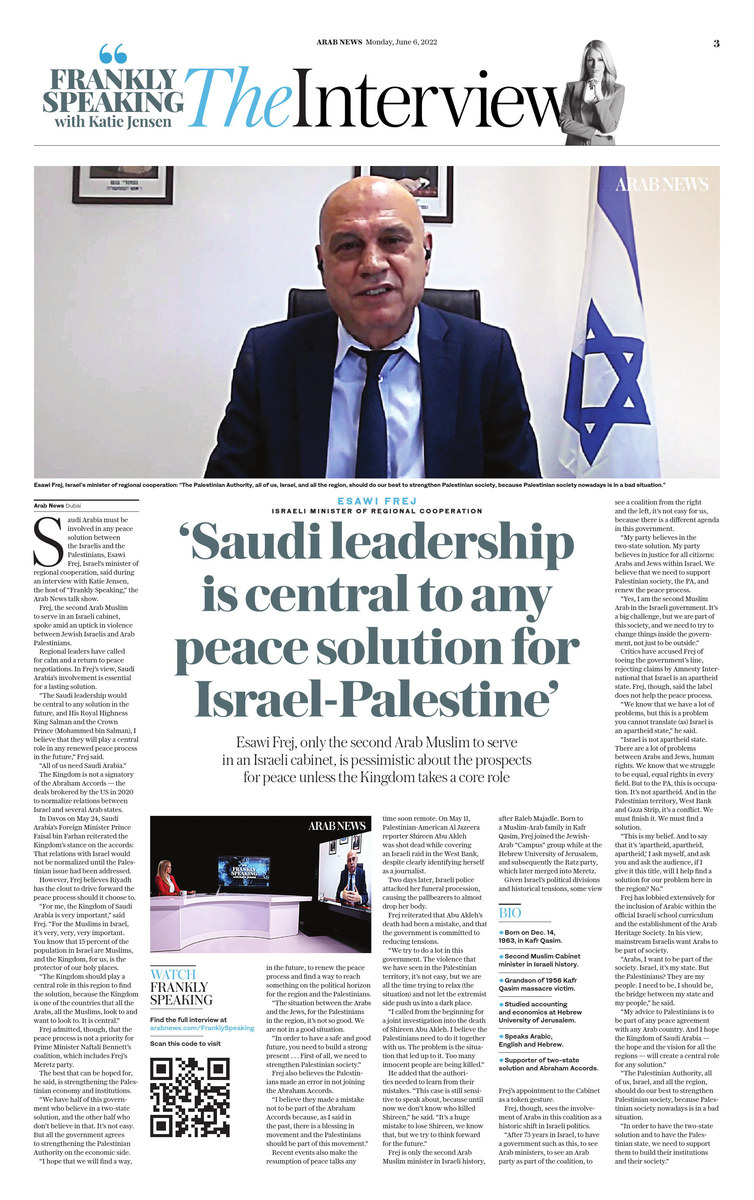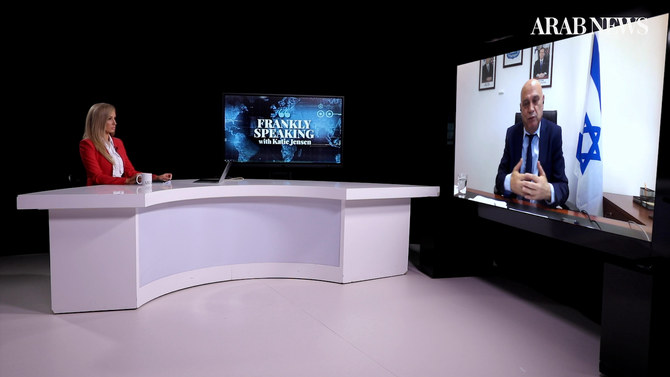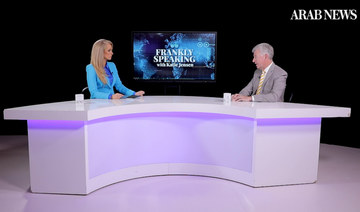DUBAI: Saudi Arabia must be involved in any peace solution between the Israelis and the Palestinians, Esawi Frej, Israel’s minister of regional cooperation, said during an interview with Katie Jensen, the host of Frankly Speaking, the Arab News talk show that features interviews with leading policymakers and business leaders.
Frej, only the second Arab Muslim to serve in an Israeli cabinet, made the comments amid an uptick in inter-communal violence in the decades-old conflict between Jewish Israelis and Arab Palestinians.
Arab leaders across the region have called for calm and appealed for both sides to return to peace negotiations. In Frej’s view, Saudi Arabia’s involvement is essential to reaching a lasting solution.
“The Saudi leadership would be central to any solution in the future and His Royal Highness King Salman and the Crown Prince (Mohammed bin Salman), I believe that they will play a central role in any renewed peace process in the future,” Frej said.
“All of us need Saudi Arabia.”

Esawi Frej, Israel’s minister of regional cooperation, speaks with Katie Jensen, the host of “Frankly Speaking,” the Arab News talk show. (AN photo)
The Kingdom is not a signatory of the Abraham Accords — a series of deals brokered by the US in 2020, which helped to normalize relations between Israel and several Arab states, including the UAE, Bahrain, and Morocco.
Speaking at the World Economic Forum in Davos on May 24, Saudi Arabia’s Foreign Minister Prince Faisal bin Farhan reiterated the Kingdom’s stance on the accords, stating it would not normalize relations with Israel until the Palestinian issue had been addressed.
However, Frej believes Saudi Arabia has the regional clout and the standing among Arabs and Muslims to drive forward the peace process between the Israelis and the Palestinians should it choose to take the lead.
“For me, the Kingdom of Saudi Arabia is very important,” said Frej. “For the Muslims in Israel, it’s very, very, very important. You know that 15 percent of the population in Israel are Muslims and the Kingdom for us is the protector of our holy places. It’s very important.
“The Kingdom should play a central role in this region to find the solution, because the Kingdom is one of the countries that all the Arabs, all the Muslims look to, and want to look to. It is central.”
Asked how confident he is about the prospects for peace within his own lifetime, Frej admitted the process is not a priority for the government of Prime Minister Naftali Bennett — a coalition that features Frej’s own left-wing Meretz party.
In Frej’s view, the best that can be hoped for under the current government is a strengthening of the Palestinian economy and its institutions.
“We have half of this government who believe in a two-state solution and the other half who don’t believe in that. It’s not easy. But all the government agrees to strengthening the Palestinian Authority on the economic side.
“I hope that we will find a way, in the future, to renew the peace process and find a way to reach something on the political horizon for the region and the Palestinians. But this government is a complicated government. Our policy is not there.”
Asked whether the recent outbreak of violence has complicated the peace process and caused embarrassment for those Arab countries who have signed the Abraham Accords, Frej said these events had demonstrated the need for stronger Palestinian institutions.
“The situation between the Arabs and the Jews, for the Palestinians in the region, it’s not so good. We are not in a good situation,” he said.
“We tried 30 years ago to have Oslo and to try and begin a new period in the region. And I’m sorry to say that we failed. Now we try to build new confidence measures between the Palestinian and the Israelis and to have the trust.
BIO: Esawi Frej
* Born on Dec. 14, 1963, in Kafr Qasim.
* Second Muslim Cabinet minister in Israeli history.
* Grandson of 1956 Kafr Qasim massacre victim.
* Studied accounting & economics at Hebrew University of Jerusalem.
* Speaks Arabic, English and Hebrew.
* Supporter of two-state solution & Abraham Accords.
“In order to have a safe and good future, you need to build a strong present. Now when I speak about the present, nowadays, the Palestinian Authority is weak. Palestinian society is weak. First of all, we need to strengthen Palestinian society.”
As a strong supporter of the normalization deal, Frej believes the Palestinians made a big mistake in not joining the Abraham Accords.
“I think the Palestinians should be part of this movement. I believe they made a mistake not to be part of the Abraham Accords because, as I said in the past, there is a blessing in movement and the Palestinians should be part of this movement.”
If recent events are anything to go by, the chances of resuming peace talks any time soon appear remote.
On May 11, Palestinian-American Al Jazeera reporter Shireen Abu Akleh was shot dead while reporting on an Israeli police raid in the West Bank, despite wearing clearly visible press patches on her blue helmet and flak jacket.
Two days later, as Abu Akleh’s coffin was carried from the French Hospital in Jerusalem for burial, Israeli police attacked the funeral procession, causing the pallbearers to almost drop her body.
Asked whether these were the actions of a government truly interested in seeking peace with the Palestinians, Frej reiterated that Abu Akleh’s death had been a mistake and that the government is committed to reducing tensions.
“It’s not an easy government. We are from the right to the left, and, from the left side of this government, we believe that we must review the peace process and try to calm the situation in the West Bank.

Esawi Frej, Israel’s minister of regional cooperation, is interviewed by Katie Jensen, the host of “Frankly Speaking,” the Arab News talk show. (AN photo)
“We try to do a lot in this government. The violence that we have seen in the Palestinian territory, it’s not easy, but we are all the time trying to relax (the situation) and not let the extremist side push us into a dark place.
“I called from the beginning for a joint investigation into the death of Shireen Abu Akleh. I believe the Palestinians need to do it together with us. The problem is the situation that led up to it. Too many innocent people are being killed.
“We will try to do our best (to see) that the killing of Shireen Abu Akleh will be the last one and we can find ways to be together.”
Pressed on how the Israeli government can possibly claim to want to ease tensions while its forces are filmed attacking a funeral procession, Frej said the authorities needed to learn from their mistakes.
“This case is still sensitive to speak about, because until now we don’t know who killed Shireen,” he said. “It’s a huge mistake to lose Shireen, we know that, but we try to think forward for the future.”
Frej is only the second Arab Muslim minister in Israeli history, after Raleb Majadle. Born to a Muslim-Arab family in Kafr Qasim, Frej joined the joint Jewish-Arab “Campus” group while at the Hebrew University of Jerusalem, and subsequently joined the Ratz party, which later merged into Meretz.
Given Israel’s stark political divisions and historical tensions, some view Frej’s appointment to the cabinet to be purely symbolic — a tokenistic gesture rather than a reflection of changing attitudes.
“It’s not symbolic,” said Frej. “It’s not easy, but it’s not symbolic.”
Rather, Frej sees the formation of the coalition government and the involvement of Arabs as a historic shift in Israeli politics.
“After 73 years in Israel, to have a government such as this, to see Arab ministers, to see an Arab party as part of the coalition, to see a coalition from the right and the left, it’s not easy for us, because there is a different agenda in this government.
“I am from the left side. My party believes in the two-state solution. My party believes in justice for all citizens: Arabs and Jews within Israel. We believe that we need to support Palestinian society, the Palestinian Authority, and renew the peace process.
“Yes, I am the second Muslim Arab in the Israeli government. It’s a big challenge, but we are part of this society, and we need to try to change things inside the government, not just to be outside.”
Critics have accused Frej of toeing the government line by rejecting claims by the human rights monitor Amnesty International that Israel is an apartheid state. Pressed on the point, Frej said such labels are not helpful and do not help the peace process.
“Within Israel we have a lot of problems, criticism of Jews and Arabs, that the Arabs, the Arab society, is not in the first class with the Jewish. We know that we have a lot of problems, but this is a problem you cannot translate (into saying) Israel is an apartheid state.
“Israel is not apartheid state. There are a lot of problems between Arabs and Jews, human rights. We know that we struggle to be equal, equal rights in every field. But to the Palestinian Authority, this is occupation. It’s not apartheid. And in the Palestinian territory, West Bank and Gaza Strip, it’s a conflict. We must finish it. We must find a solution.

Katie Jensen hosts Frankly Speaking, the Arab News talk show that features interviews with leading policymakers and business leaders. (AN photo)
“This is my belief. And to say that it’s ‘apartheid, apartheid, apartheid,’ I ask myself and ask you and ask the audience, if I give it this title, will I help find a solution for our problem here in the region? No.”
Frej has lobbied extensively for the inclusion of Arabic as a language within the official Israeli school curriculum and the establishment of the Arab Heritage Society. Does he feel that the Israeli people are with him or against him over these changes?
According to Frej, the mainstream in Israel wants the Arabs to be part of the society.
“Arabs: I want to be part of the society. Israel: It’s my state. But the Palestinians? They are my people. I need to be, I should be, the bridge between my state and my people,” he replied, adding: This is the correct way. This is the right way … . The majority of the Arab sector in Israel … chose this way.”
What, then, is Frej’s advice to the Palestinians if they wish to further the cause of peace?
“My advice to Palestinians is to be part of any peace agreement with any Arab country. And I hope the Kingdom of Saudi Arabia — the hope and the vision for all the regions — will create a central role for any solution.
“And the other thing that I need to say is that the Palestinian Authority, all of us, Israel, and all the region, should do our best to strengthen Palestinian society, because Palestinian society nowadays is in a bad situation.
“In order to have the two-state solution and to have the Palestinian state, we need to support them to build their institutions and their society.”


























